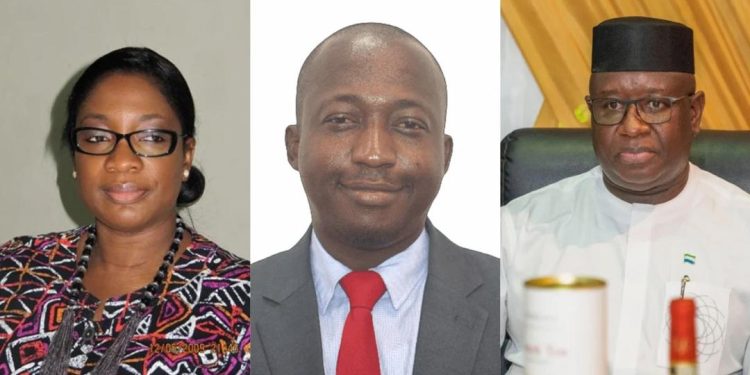By Mackie M. Jalloh
The suspension of Auditor General Mrs. Lara Taylor-Pearce and Deputy Auditor General Mr. Tamba Momoh has ignited a heated debate in Sierra Leone, with Opposition Chief Whip in the House of Parliament, Hon. Abdul Karim Kamara leading the charge against the government’s decision. The timing of these suspensions, which coincides with the release of crucial Audit Service Sierra Leone Reports on state resource management, has raised significant concerns about potentials of politically motivated ploys behind the move.
Hon. Kamara, known for his staunch advocacies for transparency and accountability, has openly criticized the government’s actions, alleging that the suspensions are a strategic manoeuvre to undermine the integrity of the auditing process. This controversy comes at a time when Sierra Leone is grappling with issues of corruption and governance, making the role of independent oversight institutions more critical than ever.
During a recent parliamentary session, Hon. Kamara passionately denounced the suspensions, framing them as a blatant attempt to obstruct transparency and accountability in government operations. He pointed to the coincidence of the suspensions with the forthcoming release of audit reports that are expected to scrutinize the management of state resources. According to Kamara, this timing suggests a deliberate effort to discredit or side line those responsible for exposing financial mismanagement and corruption.
“The recent actions against the Auditor-General and her Deputy are deeply troubling,” Hon. Kamara stated. “It is highly suspicious that these suspensions come just as critical audit reports are about to be released. This raises serious questions about the government’s commitment to transparency and its willingness to confront corruption.”
Hon. Kamara’s criticism is underscored by a broader context of governmental accountability. He referenced past instances of financial misconduct within the Presidential office, notably highlighted in the 2020 audit report, which revealed significant embezzlement and mismanagement of public funds. This historical context adds weight to Kamara’s argument that the current suspensions could be part of a broader pattern of evading scrutiny and accountability.
The Opposition Chief Whip has called for a united stand among lawmakers to reject the tribunal report that validates the suspensions, emphasizing the need for Parliament to prioritize national interests over political agendas. He argued that undermining the role of the Audit Services Sierra Leone jeopardizes the fundamental principles of good governance and accountability that are essential for the country’s democratic health.
“This is a critical juncture for Sierra Leone,” Kamara asserted. “We must not allow political games to undermine the integrity of our institutions. The independence of the Auditor- General and Deputy Auditor-General is crucial to ensuring that public funds are managed with the highest level of integrity and transparency.”
The suspensions have not only sparked political controversy but also elicited concern among the public and civil society groups who view the Auditor-General’s office as a key player in holding the government accountable. The potential impact of these actions on the public’s trust in governmental institutions is significant, with many fearing that such moves could set a dangerous precedent for future oversight and accountability.
As Parliament debates the legitimacy and implications of these suspensions, the outcome will be pivotal in shaping the future trajectory of Sierra Leone’s governance. The debate highlights a critical moment in the country’s political landscape, where the commitment to combating corruption and upholding transparency will be tested. Hon. Kamara’s strong stance reflects a broader call for maintaining the independence of key oversight institutions and ensuring that public officials are held to the highest standards of accountability.
In conclusion, the suspensions of Sierra Leone’s top auditors have not only raised questions about the government’s motives but also sparked a wider discussion about the importance of safeguarding the principles of transparency and accountability. As the debate continues, the focus remains on whether the country’s governance structures will uphold these essential values in the face of mounting political pressures.












